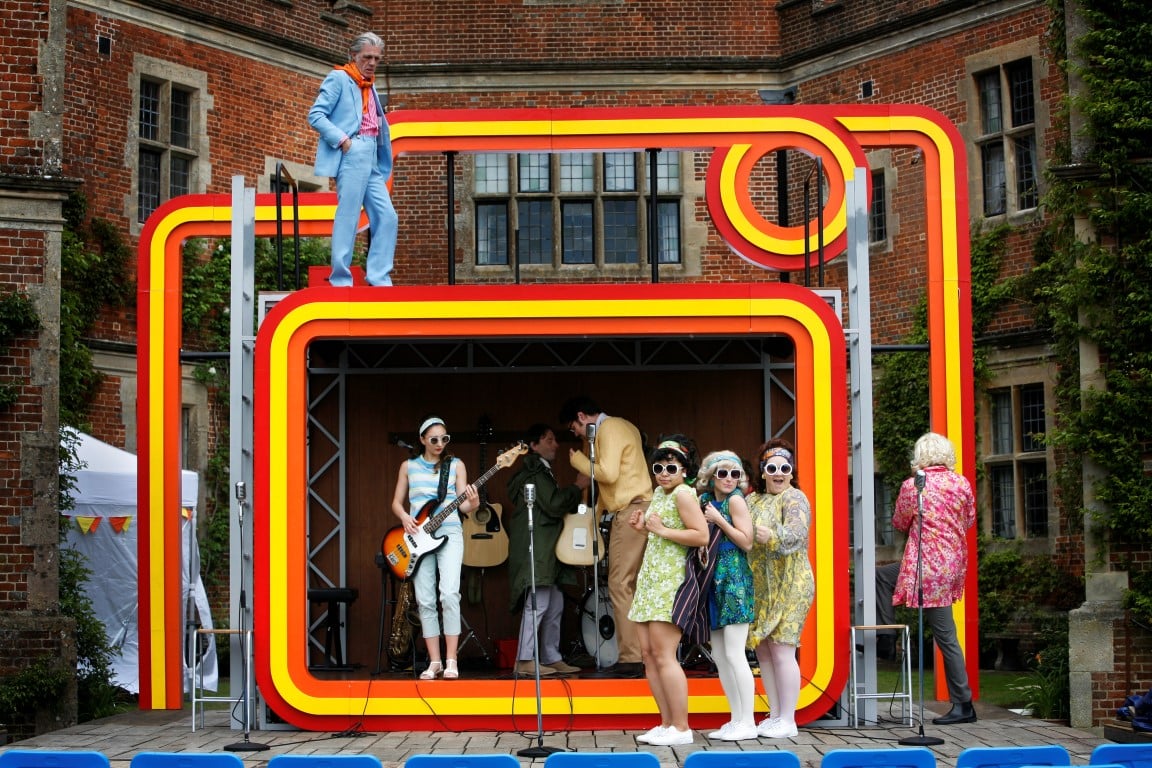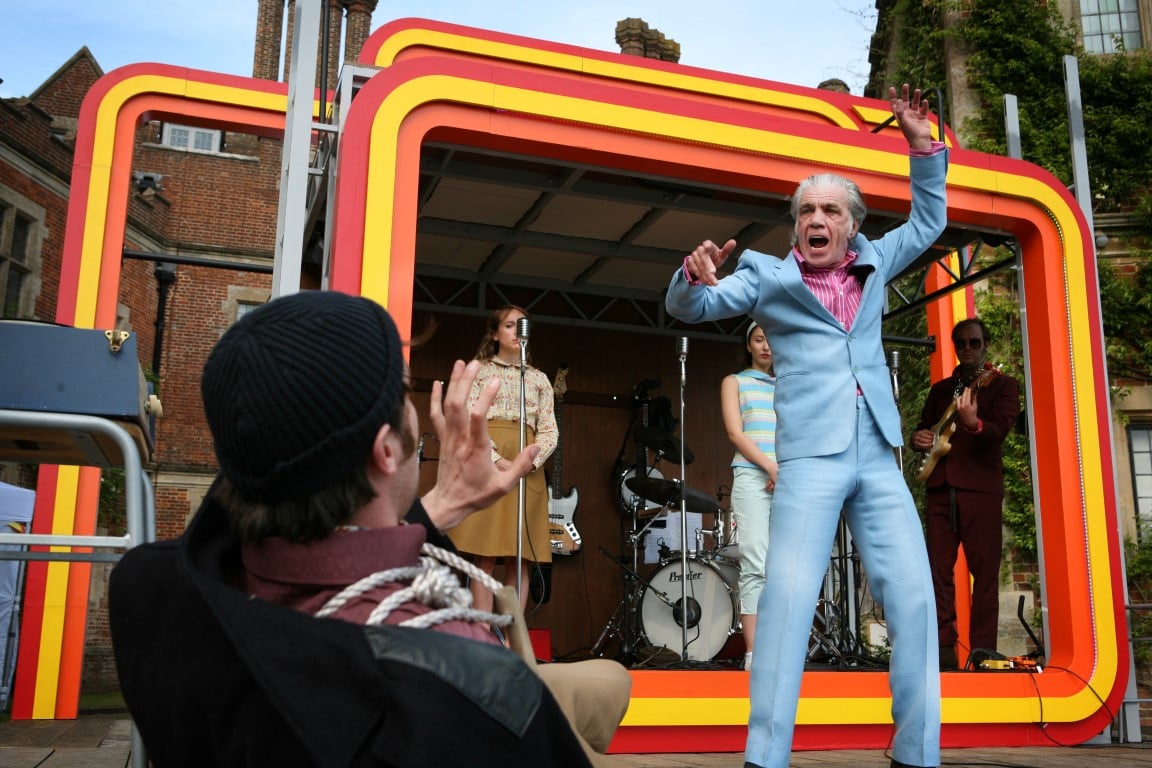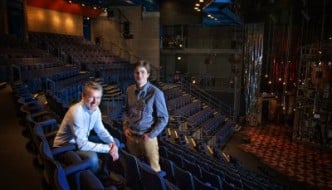
Photo Credit: Gary Calton.
“That I might sing it, madam, to a tune. / Give me a note: your ladyship can set”, says Lucetta in the second scene of The Two Gentlemen of Verona, and it is as though she is issuing an express challenge for director Nick Bagnall. She asks that he set the tone and raise the bar, that he dream bigger and dare harder: you hum it, we’ll play it. And Bagnall, though lacking somewhat in ladyship, bravely answers the call with a bold, radical reimagining filled to the brim with music and magic.
Sitting somewhere between traditional theatre and gig, the real strength of the production lies in its innate understanding of music in Shakespeare. Aside from the musicality of the language itself, there are over one hundred specific examples of songs in the Shakespearean canon. These songs would work in much the same way as they do in theatres today: they heightened the action onstage, they reworked and riffed upon popular songs of the time (the pop culture references of their day!) and – most importantly – they allowed for welcome respite from a particularly convoluted plot and the opportunity for an audience to clap along.
Because everybody likes to clap.
Seizing upon all of this, Bagnall grabs Shakespeare’s music by the scruff and uses it in precisely the same way, though not before dragging it through the centuries and throwing it down firmly in the inspired groovy exuberance of 1966. The setting feels at once both bizarre and strikingly obvious for a play concerned with the colliding of worlds and a brash, teenaged immediacy. It offers Bagnall a plethora of possibilities, being at once nostalgic and familiar: a contemporary historicism with which he can comment upon the social mores of a society that (alas) don’t seem to have changed all too much.
It was a time defined by its sound and music, here, permeates every aspect of the play. We are greeted, as an audience, by an eclectic 60s soundtrack and a set design taking its inspiration from Top of the Pops (with all of the current implications that it brings). Music becomes a means of comfort, consolation and corruption, of discovery and transformation. Doo-wop songs become a means of proposing marriage. Fierce duels become equally earnest dance-offs. Childhood tunes becoming the tenuous link between best friends and, in a particularly clever conceit, Shakespeare’s love letters become homemade vinyls with their sweet-nothings scribbled, like lyrics, onto the back of dust jackets. Actors are called upon to become accomplished musicians and one musician in particular is called upon to become both actor and dog.
Music – alongside a beautifully-sparse set design – is also used as a means of clearly delineating the play’s contrasting worlds. The beige, boring Verona is the province of the crooner and the awkward arms-length sidestep (making you wonder why Guy Hughes’ Valentine hasn’t tried to escape sooner), whilst the low-burning red lights of Milan (to which Valentine escapes) promise a sexier sound: a new-found-land discovering itself. This is a world of shorter skirts and sexual liberation, of all-night parties and drugs on tap.

Photo Credit: Gary Carlton
But outward gloss would seem to conceal inward grime, as typified by the wonderful Garry Cooper who – having already been a questionable caretaker – plays the Duke of Milan with such gusto as to embody an era. Our first impressions of a playboy prince in baby blue are quickly subverted by an inner disturbance that seems to infect his entire body. He is a strange creature made up of jaunty, angular movements, and sudden bouts of rage: the victim of a heady cocktail of drugs and patriarchal thought. He does, after all, literally threaten to lock his daughter in an ivory tower. Therein lies the danger of Milan, Bagnall seems to say: a modern society that proclaims itself progressive whilst still kowtowing to the outdated social mores at its heart. No matter how much you dress it up in velvet and corduroy, an ivory tower is still an ivory tower.
Aruhan Galieva is a beautiful, elfin Silvia trapped somewhere between the old world and the new. She can take some degree of control in her own sexuality, she can flirt and cajole attention as well as anybody in the Milanese Court, and she can wear trousers (!), but she is ultimately a financial pawn in a cold father-daughter relationship.
It is interesting, too, how Leah Brotherhead’s Julia must don a male disguise before she travels to Milan in order to “…prevent the loose encounters of lascivious men”. The world of the play is a predatory one, in which women must become men to survive or else risk becoming playthings. This same conflict leads to one of the play’s most poignant scenes in which Julia smiles at any sign of misplaced affection from a Proteus who has long cast her off and settled his attentions instead upon Silvia. The indulgent romantic whims of Dharmesh Patels’ Proteus, for a while, turn the women of the play against one another and too little time, I feel, is spent on the emotional exploration of Proteus’ conflicted journey. This is a man whose lust drives him to betray sworn friends and threaten rape, and to announce his change of character simply with a change of shirt does him a disservice.
Despite some awkward Shakespearean clowning and audience participation (that never seems to push far enough), this is a production of real exuberance and authority. Nick Bagnall, with his clear vision and major reinterpretation, has created a piece of work that very possibly outdoes the original text. Long gone is the outdated Elizabethan rom-com and in its place is a searing, passionate piece of social commentary. A work that has its audience both cheering wildly at the musical talents of the onstage cast and sitting motionless, watching some of the most discomforting moments of theatre I’ve ever seen. It’s a production of reverent irreverence – and all the better for it – perfectly at home in Emma Rice’s inaugural Wonder Season at Shakespeare’s Globe.
The Two Gentlemen of Verona is running until October 29th. Tickets can be bought from here.
Filed under: Theatre & Dance
Tagged with: 1966, Adam Keast, Amber James, Aruhan Galieva, Charlotte Mills, Christine Schmidle, Dharmesh Patel, Emma Rice, Fred Thomas, Garry Cooper, Giles Block, Glynn MacDonald, Guy Hughes, James Fortune, Katie Sykes, Kevin McCurdy, Laura Keefe, Leah Brotherhead, Leigh Davies, Liverpool Everyman & Playhouse, Nick Bagnall, Paul Russell, Sydney Florence, theatre, Tom Jackson Greaves, Two Gentlemen of Verona, William Shakespeare



Comments